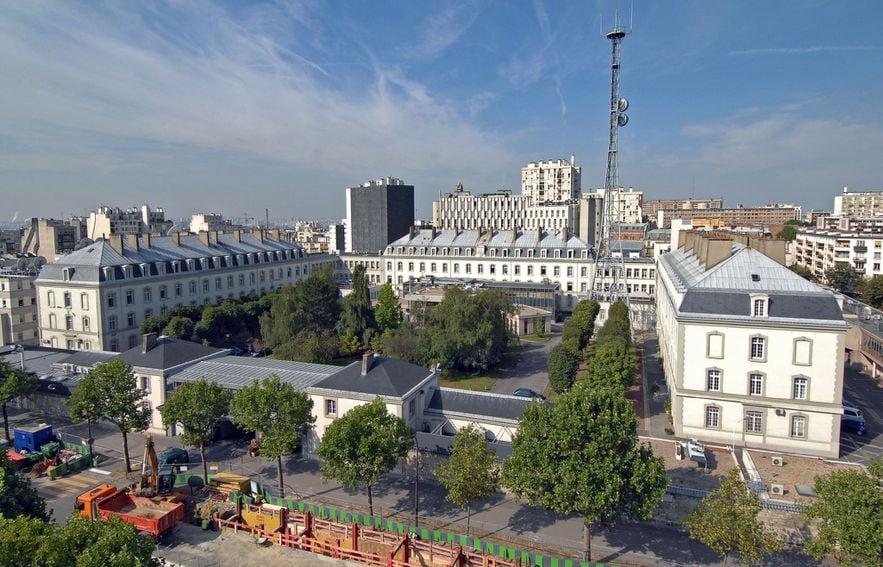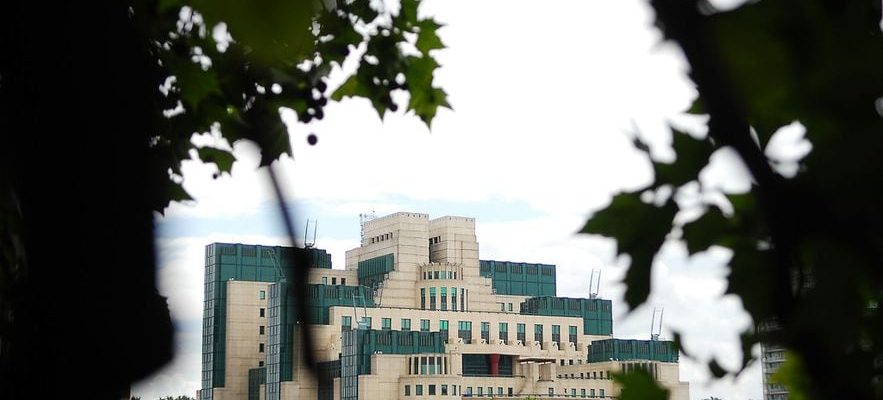Russia’s invasion of Ukraine was preceded by an unusual declassification of documents by US intelligence services. A discreet activity by nature, espionage and its productions are more highlighted in the context of a world of increasing digitalization.
In Secret State, Clandestine State: Essay on Democratic Transparency (Gallimard), Sébastien-Yves Laurent provides a rare analysis of these shadowy exercises, focusing on recent developments in the West. “There is a relative closeness between the United States and France on the dialogue between democracy and intelligence,” explains this professor of political science at the University of Bordeaux, “while it is quite different in the British case, which has a very powerful culture of secrecy.”
L’Express: What role does intelligence play in current international relations?
Sébastien-Yves Laurent: Its role is fundamental and more important than before. For two reasons: because States rely more and more on their intelligence services and a little less on their diplomatic services; because intelligence of technical origin, in a digitized world, is easier to collect than before and in greater quantity. Two recent examples have confirmed this importance. The Hamas attack in Israel on October 7, 2023, resulted from a failure of intelligence or its exploitation, with very strong warnings not having been heeded by the Netanyahu government. From the end of 2021, the United States and the United Kingdom led a campaign in the international media to warn of the imminence of the Russian war of aggression in Ukraine by declassifying documents. European governments were not convinced.
This declassification goes against habits…
I mention it in the book: the public use of classified information, protected by a legal system, is more frequent than before, mainly for the countries of the Anglosphere, we speak of “campaigning”. Let us remember that the United States and the United Kingdom had already done this to justify their entry into war in Iraq. This is also the case for France, which made public, in 2013, analyzes carried out by the Directorate of Military Intelligence proving the use of combat gas by the government of Bashar al-Assad against the civilian populations of Ghouta. , near Damascus. There was then an agreement between the United States and France to prepare bombings, before President Obama renounced it although he had set a “red line”. No one denied that there was a gas attack, or that Putin was massing troops on his border with Ukraine. It was over his intentions that there were disagreements.
Why do intelligence services find themselves engaging in diplomacy?
There is a diplomacy, partly public, which is that of the Ministry of Foreign Affairs and embassies. And then there is what I call in the book a much more discreet “paradiplomacy”, of intelligence, which involves cooperation, exchanges of information, but also discussions with actors with whom we do not discuss Never. This is a fairly recent development, very far from the initial missions of the services when they were created in their modern form at the end of the 19th century.
What are the differences in approach between the United States, the United Kingdom and France in terms of intelligence?
This is at the heart of my book: the three countries have fairly similar political origins. They have each experienced revolutions, all three are liberal and have each exercised regional, continental or global power throughout their history. But the structuring of their intelligence is quite different. I show that there is a relative closeness between the United States and France on the dialogue between democracy and intelligence, while it is quite different in the British case, which has a very powerful culture of secrecy.
The headquarters of MI6, the British secret service, in London.
© / afp.com/Bertrand Langlois
What form does it take?
In Great Britain there is a habitus in the sense that Pierre Bourdieu understood it, that is to say the fact that individuals are bearers of dispositions transmitted by the social structures to which they belong. This habit of secrecy was born with the State. The policy was opaque, as European aristocratic elites were required to be discreet and secretive, as can be read in The prince by Machiavelli (1532) and The Court Man (1647) by Baltasar Gracian. In Great Britain, this habitus extended to all the ruling strata and to the intelligence services, of which they formed the executives. In addition, since 1913, there has been a relatively unknown system of prior and preventive censorship of the press across the Channel. The British media, whose owners communicate with the authorities, cannot freely discuss questions of national security.
For a long time, in the United Kingdom, spies were aristocrats, while in France, they were presented as barbouzes…
The most improving intelligence culture is British. This is linked to the way elites are trained. Intelligence services, like the Foreign Office, recruit from the best universities, Oxford and Cambridge. On the other hand, it is in the United States that publicity has been the most extensive, generating a strong social promotion of intelligence activities. Hollywood studios were able to film in FBI premises as early as 1935. In France, intelligence executives tended to come from the military world. But there has been a catch-up phenomenon and, today, the DGSE is mainly made up of high-level civilians.
What is this clandestine State which coexists, according to you, with what you call the legal secret State?
The legal secret state corresponds to the scope of the intelligence services discussed in Parliament and legalized by law. The clandestine State is the part of the secret activity of the State which is deployed in a lawless zone, alongside this legal secret State. This was for example the case of France during the Indochina War, when the SDECE, the foreign intelligence service of the time, trafficked opium with mountain minorities to supply slush funds. Or when the CIA practiced torture after September 11, 2001, in external prisons, often located on European territory, on suspects of terrorist activities. Clandestine also concerns all cyber activities, while the international system is increasingly subject to transparency constraints.
However, you underline in your book the fact that intelligence activities are increasingly controlled…
The fact that the State constrains itself in its capacity for action is in no way natural. In France, the National Commission for Intelligence Techniques (CNCTR) gives figures each year on the use of surveillance techniques. But it is different for external surveillance activities. Internationally, there is no supreme authority that can assume control. However, there are also embryos of reflection in the United States and in France, which tend to supervise this activity when States wish to defend themselves from the threats and interference of which they are the object.
Digitization increases the possibilities for citizen surveillance…
I do not believe at all that we have shifted, in France, to a surveillance state. I believe in the solidity of the legal framework and the work of supervisory authorities like the CNCTR. French citizens benefit from the law which established the National Commission for Information Technology and Freedom, in 1978, and from the General Regulation on Personal Data of 2018. It is in the European Union that the strongest protection of personal data exists today. individual data with regard to any form of state surveillance. It is very different in the countries of the Anglosphere: there is no real right to digital privacy in the United States or Great Britain, where state surveillance capacities are more strong.
In China, this possibility of permanent surveillance leads to almost absolute control of individuals…
In non-democratic countries, the function of intelligence is completely different. There is of course foreign intelligence, which generates massive espionage in Western countries, destabilization and interference. We realize this well today. But there is also internal intelligence, serving what was formerly called social control. In China, this reaches a considerable dimension: the power of surveillance systems, coupled with the power of artificial intelligence, makes it possible, in all public spaces, to identify individuals and monitor them very closely. In the novel 1984 by George Orwell, surveillance took place in the home via the telescreen [NDLR : à la fois téléviseur et caméra de surveillance]. In China, it’s as if there was a telescreen that followed individuals everywhere. Xi Jinping’s China goes beyond what Orwell imagined.

The headquarters of the Directorate General for External Security (DGSE) in Paris
© / afp.com/Ho
In France, the supervision of intelligence activities is also ensured by the Parliamentary Delegation for Intelligence (DPR)…
France came very late to this parliamentary control by creating this Delegation in 2007 which does very important work and produces many documents. In the United States, it is the oldest, but also the most extensive and the most inquisitorial. The two permanent committees of the Senate and the House of Representatives have extremely broad powers to control services like the CIA. In Great Britain, the Intelligence and Security Committee, established in 1994, was only truly able to exercise parliamentary oversight in 2013, when its powers were strengthened.
Wouldn’t there be an interest in the DPR being able to more directly control what the spies do?
This seems totally impractical to me. It is not possible to evaluate in a timely manner what intelligence agents produce, without risking compromising ongoing operations, sources (even anonymized), and methods. Over the long term, it’s different. I think we could examine ten, fifteen years after a crisis, what an intelligence organization was able to produce. In the case of the 2015 attacks, parliamentary fact-finding missions have already examined the reasons for this failure. Parliament must be able to examine possible failures of state services, but once again, I think that this is not practicable in the short term.
The Court of Justice of the European Union and the European Court of Human Rights are considered threats by intelligence services. Does this seem justified to you?
The Europe of public freedoms was created by putting in place legal remedies. However, European courts have looked quite closely since 1985 at everything relating to surveillance. And the Court of Justice of the EU condemned in 2020 French practices regarding the retention of connection data. The French Council of State responded very firmly in 2021, saying that in France, it was a matter of national security, outside the jurisdiction of the Court. There is a permanent hiatus between national jurisdictions linked to a State and European jurisdictions which are not linked to a State. This hiatus will not stop repeating itself. But European courts also play a positive role: in the past, they have pushed States to give legal status to some of their intelligence services and to establish control authorities.
.
